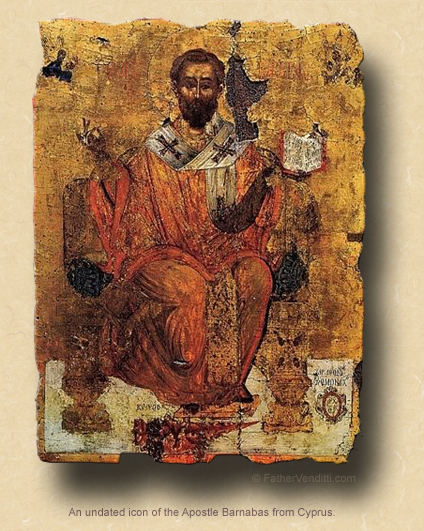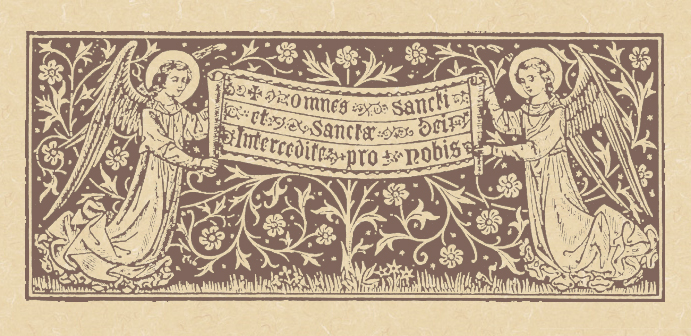Without Cost You Have Received; Without Cost You Are to Give.
The Memorial of Saint Barnabas, Apostle.
Lessons from the proper, according to the ordinary form of the Roman Rite:*
• Acts 11: 21-26; 13: 1-3.
• Psalm 98: 1-6.
• Matthew 10: 7-13.
The Third Class Feast of Saint Barnabas, Apostle.
Lessons from the proper, according to the extraordinary form of the Roman Rite:
• Acts 11: 21-26; 13: 1-3.
• Psalm 18: 5, 2.
• Matthew 10: 16-22.
The Third Saturday of the Apostles Fast; and, the Feast of the Holy Apostles Bartholomew & Barnabas.
First & third lessons from the pentecostarion, second & fourth from the menaion, according to the Ruthenian recension of the Byzantine Rite:
• Romans 6: 11-17.
• Acts 11: 19-26, 29-30.
• Matthew 8: 14-23.
• Luke 10: 16-21.
FatherVenditti.com
|
 7:04 AM 6/11/2016 — “Without cost you have received; without cost you are to give” (Matt. 10: 8 NABRE). It is not without reason that Holy Mother Church has given us that beautifully poetic line to read in the Gospel lesson for the Memorial of the Blessed Apostle Barnabas. 7:04 AM 6/11/2016 — “Without cost you have received; without cost you are to give” (Matt. 10: 8 NABRE). It is not without reason that Holy Mother Church has given us that beautifully poetic line to read in the Gospel lesson for the Memorial of the Blessed Apostle Barnabas.
Barnabas, of course, was the Apostle who was first sent to the city of Antioch, where Peter had established the Church, where he was known to be a very powerful preacher; that's recounted for us in our first reading from the Acts of the Apostles. He was then sent to travel with the Blessed Apostle Paul on that apostle's first missionary journey. But the Roman Breviary of the extraordinary form, which I use to pray the Divine Office, reports a lot more about him: when he was first recruited to be an apostle, he sold a piece of property he owned to give the money to the Church. He was from Cyprus, and was a member of the Jewish Levite clan, and had been a rather wealthy land owner; and, I can only guess that's the reason that today's Gospel contains that wonderful line, “Without cost you have received; without cost you are to give.”
Now, we might be tempted to say that that's a very nice lesson for people who have money, but we don't. But, as I often like to say, poetry is what is lost in translation, and when you look at the line from Matthew in the Greek, what he actually says is δωρεὰν ἐλάβετε, δωρεὰν δότε, or, if you prefer the Latin, in the Vulgate it reads gratis accepistis, gratis date, which literally translates as “freely you received, freely give”, which, for us, could change the whole meaning of the passage.
You realize, of course, that everything said by our Lord in the Holy Gospel has two meanings: there's what he's saying to his immediate audience as described in the passage itself, then there's what he is saying to us as we read his words centuries later. In this case, our Lord is giving the Twelve their marching orders before He first sends them out to preach. To them, He's clearly talking about money because He's addressing the subject of how they're to support themselves during this preaching tour He's sending them on; but, to us He's not talking about money at all. The “cost” He's talking about to us is not a cost out of our wallets, but a cost out of our hearts.
The people who come here every day to assist in the many ways they do, helping the priest prepare for Holy Mass, serving the Holy Mass, reading at Holy Mass, leading the recitation of the Holy Rosary, taking care of the flowers, helping to set up for outdoor events, doing a thousand different things, many of which often go unnoticed, are giving something to our Lord, his Mother and his Church far more expensive than anything they could dig out of their wallets. It's very easy for someone who has money to dig some out of his pocket and throw it into a collection basket, not that I'm suggesting they shouldn't;—I couldn't have been a pastor for so many years with that attitude—but, it's not quite so easy to give that precious gift of time and effort. I've often said that the poor give the most to the Church because what they have to give, they give in abundance; and, what they have to give is their time, their prayer, the offering up of their sufferings for priests, for the Church, for the Holy Souls, and for themselves.
During this Holy Mass let's ask the Blessed Apostle Barnabas, who made himself poor in the purse in order to make those to whom he preached rich with the Truth, to bless and watch over all those who give the precious gift of their time to Christ.

* Only the first lesson must be read. The psalm and Gospel lesson provided in the proper are optional, and may be replaced by lessons from the common or the feria.
|

